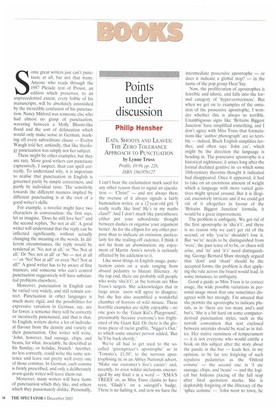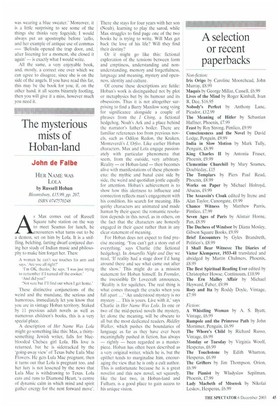Points under discussion
Philip Hensher
EATS, SHOOTS AND LEAVES: THE ZERO TOLERANCE APPROACH TO PUNCTUATION by Lynne Truss Profile, £9.99, pp. 228, ISBN 1861976127 Some great writers just can't punctuate at all, but not that many. Anyone who reads through the 1987 Pleiade text of Proust, an edition which preserves, to an unprecedented extent, every foible of his manuscripts, will be absolutely astonished by the incredible confusion of his punctuation. Nancy Mitford was someone else who had almost no grasp of punctuation, wavering between a Molly Bloom-like flood and the sort of delineation which would only make sense in German, marking off every subordinate clause — Evelyn Waugh told her, unkindly, that like theology punctuation was simply not her subject. There might be other examples, but they are rare. More good writers can punctuate expressively, I suspect, than can spell correctly. To understand why, it is important to realise that punctuation in English is governed partly by simple correctness, and partly by individual taste. The sensitivity towards the different nuances implied by different punctuating is at the root of a good writer's skills. For example, a novelist might have two characters in conversation: the first says, let us imagine, 'Does he still love her?' and the second replies, `No not at all.' A good writer will understand that the reply can be inflected significantly, without actually changing the meaning or the words. In different circumstances, the reply would be rendered as` No, not at all,' or `No. Not at all.' Or 'No; not at all' or 'No — not at all —' or 'No! Not at all!' or even `No? Not at all?' A good writer has to be aware of fine nuances, and someone who can't control punctuation suggestively will have substantial problems elsewhere. Moreover, punctuation in English can be varied very widely, and still remain correct. Punctuation in other languages is much more rigid, and the possibilities for expressive variation in German, say, are far fewer; a sentence there will be correctly or incorrectly punctuated, and that is that. In English, writers derive a lot of individual flavour from the density and variety of their punctuation. One writer will write, 'John, however, had sausage. chips, and beans, for what, invariably, he described as his Sunday, or holiday, brunch.' Another, no less correctly, could write the same sentence and leave out pretty well every one of those commas. In German, each comma is firmly prescribed, and only a deliberately avant-garde writer will leave them out.
Moreover, many writers will have items of punctuation which they like, and others which they passionately dislike. Personally,
I can't bear the exclamation mark used for any other reason than to signal an ejaculation — 'Christ!' — and not always then; the overuse of it always signals a fairly humourless writer, or a 12-year-old girl. 'I really really like him! He's in my maths class!!' And I don't much like parentheses; either put your subordinate thought between dashes or organise your argument better. As for the ellipsis for any other purpose than to indicate an omission, particularly for the trailing-off cadence, I think it not far from an abomination; my enjoyment of Martin Amis's novels is seriously affected by his addiction to it. Like most things in English usage, punctuation exists on a scale ranging from absurd pedantry to blatant illiteracy. At the top end, there are probably still people who write `sha'n'e; at the bottom are Miss Truss's targets. She acknowledges that in large areas users will agree to disagree; but she has also assembled a wonderful chamber of horrors of wild misuse. These horrible examples are richly enjoyable – no one goes to the 'Giant Kid's Playground', presumably because everyone's too frightened of the Giant Kid. Or there is the glorious piece of racist graffiti, 'Nigger's Out,' to which some smarter person added, 'But he'll be back shortly.' We've all had to get used to the socalled 'greengrocer's apostrophe' as in 'Tomato's, £1.50'; to the nervous apostrophising tic in an Abbey National advert, 'Make our customer's live's easier': and, recently, to even wilder inclusions encouraged by any final s in a word — 'XMA'S TREES' or, as Miss Truss claims to have seen, `Glady's' on a salesgirl's badge. There is no halting it, and now we have the intermediate possessive apostrophe — or does it indicate a glottal stop? — in the name of the pop group Hear'Say. Now, the proliferation of apostrophes is horrible and idiotic, and falls into the formal category of 'hyper-correctness'. But when we get on to examples of the omission of the possessive apostrophe, I wonder whether this is always so terrible. Unambiguous signs like 'Britains Biggest Junction' have simplified something, and I don't agree with Miss Truss that formulations like 'author photograph' are so terrible — indeed, Black English simplifies further, and often says 'John car', which might be the direction the language is heading in. The possessive apostrophe is a historical nightmare; it arises long after the formal declined genitive in -es which some 18th-century theorists thought it indicated had disappeared. Once it appeared, it had to take on an enormous amount of weight which a language with more varied genitives might spread around. But it is illogical, excessively intricate and if we could get rid of it altogether in favour of the 'Britains Biggest Junction' formula, it would be a great improvement. The problem is ambiguity. We got rid of the first apostrophe in 'sha'n't', and there is no reason why we can't get rid of the second, or why 'you're' shouldn't lose it. But 'we're' needs to be distinguished from 'were', the past tense of to be, or chaos will arise, and 'its' and 'it's' need distinguishing. George Bernard Shaw strongly argued that 'dont' and 'slime should be the accepted forms; the problem is that applying the rule across the board would lead, in some instances, to ambiguity. Good a guide as Miss Truss is to correct usage, the wide possible variations in personal usage mean that one sometimes disagrees with her strongly. I'm amazed that she permits the apostrophe to indicate plurals, as in 'there are too many and's and hut's.' She is a bit hard on some computerderived punctuation styles, such as the newish convention that text enclosed between asterisks should be read as in italics. Her native sunniness of temperament — it is not everyone who would entitle a book on this subject after the story about the panda in the bar — leads her, in my opinion, to be far too forgiving of such repulsive pedantries as the 'Oxford comma' — the second one in 'I ate sausage, chips, and beans' — and the logical but hideous placing of the full stop after final quotation marks. She is deplorably forgiving of the illiteracy of the 'splice comma' — 'John went to town, he
was wearing a blue sweater.' Moreover, it is a little surprising to see some of the things she thinks very fogeyish; I would always put an apostrophe before 'cello, and her example of antique use of commas — 'Belinda opened the trap door, and, after listening for a moment, she closed it again' — is exactly what I would write.
All the same, a very enjoyable book, and, mostly, a correct one over which we can agree to disagree, since she is on the side of the angels. If you have read this far, this may be the book for you; if, on the other hand, it all seems bizarrely footling, then you will give it a miss, however much you need it.



























































































 Previous page
Previous page